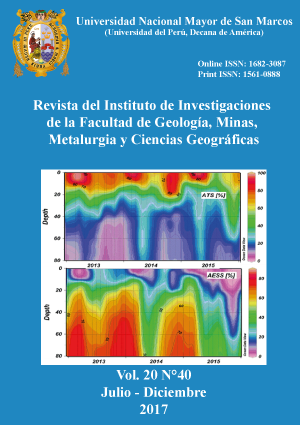Incidence of artisanal fisheries in the contamination of the beach town Puerto Lopez, Manabi Province - Ecuador
DOI:
https://doi.org/10.15381/iigeo.v20i40.14385Keywords:
Martisanal fisheries, pollutionAbstract
The following research was conducted on the beach of Puerto Lopez town located in the province of Manabí. In this research the impact of artisanal fisheries in the pollution of the beach during the months of February to July of this year. The information was collected using signing, direct observation and survey. As results of this study ten areas of fishing, where fishermen perform their work, having greater incidence of fishing cauldrons of Bollita and Punta Mala, fishing gear used by artisanal fishermen are varied, being the most used, trammel surface and bottom, these gear used in artisanal fishing activity suggest evidence of contamination residue of different type in beach areas the same that cause air pollution and this can be perceived in different areas of the beach odors also harm marine species, the combination of these problems end not pretty the place, what is a tourist place visited. With the analysis of these results we proceeded to raise the proposed Fishery Management Plan for artisanal fishermen of Puerto Lopez town.Downloads
Published
Issue
Section
License
Copyright (c) 2017 Miguel Ángel Osejos Merino, Martín Verisimo Merino Conforme, Monserrate Cristina Merino Conforme

This work is licensed under a Creative Commons Attribution-NonCommercial-ShareAlike 4.0 International License.
AUTHORS RETAIN THEIR RIGHTS:
a. Authors retain their trade mark rights and patent, and also on any process or procedure described in the article.
b. Authors retain their right to share, copy, distribute, perform and publicly communicate their article (eg, to place their article in an institutional repository or publish it in a book), with an acknowledgment of its initial publication in the Rev. Inst. investig. Fac. minas metal cienc. geogr.
c. Authors retain theirs right to make a subsequent publication of their work, to use the article or any part thereof (eg a compilation of his papers, lecture notes, thesis, or a book), always indicating the source of publication (the originator of the work, journal, volume, number and date).






